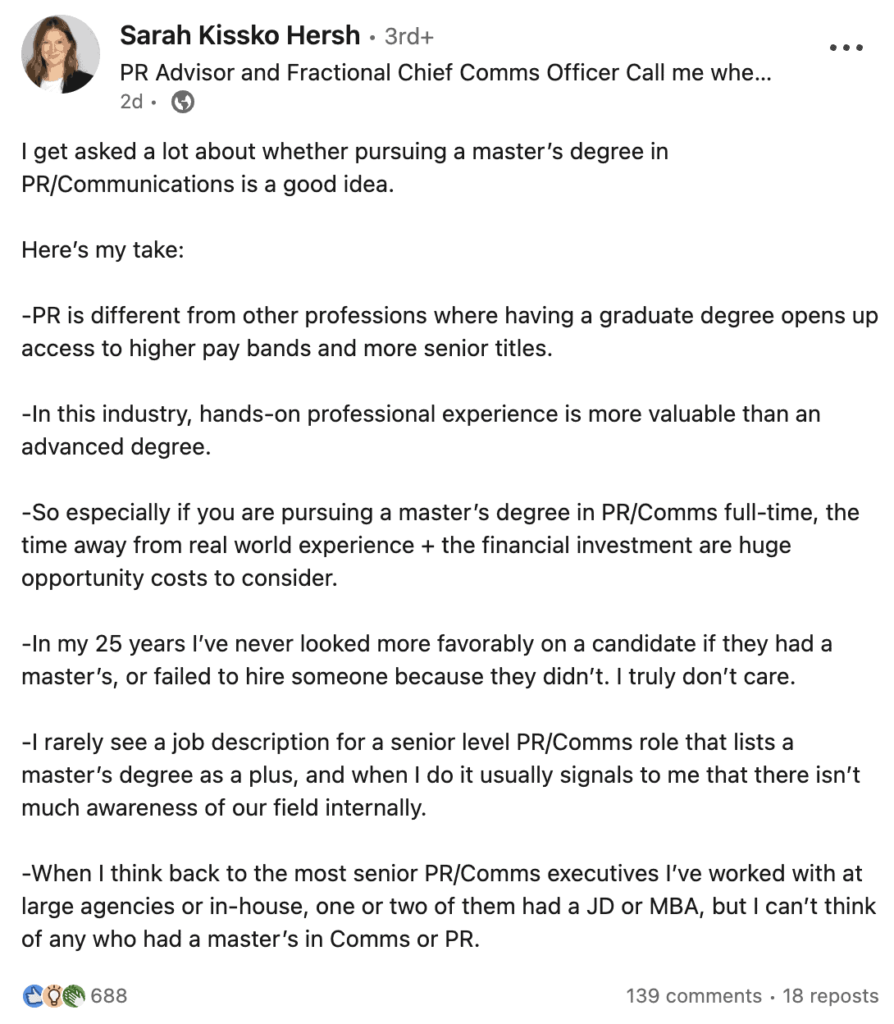Is a Master’s in Communication Worth It? The Pros and Cons

Believe it or not, getting a master’s in communication is quite a debated topic in the communications world.
Some industry professionals say that a master’s in communication is absolutely worth it while others say it’s not.
Let’s break down the pros and cons of a master’s in communication and if it’s right for you.
Is a Master’s in Communication Worth It? The Pros and Cons
What is a Master’s in Communication?
A master’s in communication is a graduate-level degree, either research-based or course-based, that teaches students the theories and strategies in communication and media.
Compared to a bachelor’s in communication, a master’s in communication can offer a deeper look into the communication theories and technical skills that shape today’s world.
Master’s students are given a chance to research the strategies of various communications fields and can often specialize in a specific stream of communications.
Some specializations include:
- Corporate communication
- Media studies
- Political communication
- Health communication
- Public relations
Master’s in communication are usually offered on a full-time or part-time basis and last from 1-2 years.
The Pros of a Master’s in Communication
A career in academia
One of the biggest reasons why many pursue a master’s in communication is to achieve a career in academic research and teaching communications.
Many universities and colleges require a minimum of a master’s degree to be able to teach and research in the chosen subject.
If you want to become a communications professor, or academic researcher, or get a PhD, a master’s in communication is a great stepping stone to achieving those goals.
Expand your skillset
Pursuing a master’s in communication can give you the time and opportunity to gain skills in communications from professors and industry leaders.
Further education can be great for those wishing to expand their skill set beyond their current professional role or level of education.
While studying communications, you could develop valuable skills like:
- Analyzing data and insights
- Written communication skills
- Public speaking
- Project management
Networking
Graduate-level degrees usually offer more opportunities to network with peers and professors thanks to smaller cohort sizes.
Studying for a master’s in communication can give students a chance to network with professors, participate in events, and meet leaders in the communications industry.
The joy of learning
Some students decide to pursue a master’s in communication for the simple reason that they want to learn more about the topic.
A master’s in communication is great for those who want to keep learning about communications in an academic setting and who want to dive deeper into specific topics through writing research papers.
The Cons of a Master’s in Communication
The cost
Needless to say, further education comes with further costs. A master’s in communication is a financial investment that should be weighed thoroughly to determine if it’s worth the cost.
Nowadays, many communications professionals and recent grads opt to gain work experience first before determining whether a master’s in communications is worth the cost.
Time away from real-world experience
This is one of the BIGGEST points of consideration for those deciding whether or not to pursue a master’s in communication.
The communications industry leans heavily on experience, and I would argue that it values experience over education. Pursuing a master’s in communication could take time away from gaining important work experience.
Hence, some communications professionals argue that pursuing higher education may do more harm than good if it takes away from real industry experience.
A higher degree doesn’t necessarily mean higher pay
As mentioned in the previous point, the communications industry doesn’t always value higher education to the same degree that other industries do.
This means that a master’s degree may not always automatically lead to a higher role or salary. Employers will usually also require additional skills or work experience to increase pay.
Also, many high-level communications roles only ask for a bachelor’s level education or equivalent. A graduate-level degree is more often seen as an asset than a necessity.
Can academia keep up with an ever-changing industry?
Unlike some of the more traditional academic programs, communications is VERY fast-paced and can change almost overnight due to new technologies, trends and pop culture.
This could mean that by the time you graduate with a master’s in communication, the strategies and skills you learned in school could already be outdated.
It can be tough for schools and professors to keep their curriculum up-to-date with the current industry.
Do communications experts think a master’s in communication is worth it?
There are plenty of conversations happening all over the internet about whether or not a master’s in communication is worth it.
Here are some thought-provoking conversations from industry leaders to learn more about their opinions on the topic.
A New York City PR Advisor’s Opinion on a Master’s in Communication
Check out this LinkedIn post by Sarah Kissko Hersh, a PR Advisor in New York City and one of LinkedIn’s Top Public Relations Voices.

A Ph.D. in Communication’s Opinions on a Master’s in Communication
Davis Foulger, a PhD in Communication and Social Psychology from Temple University says in a post on Quora that a master’s in communication can create many opportunities for communications professionals.

Is a Master’s in Communication Right for You?
Everyone has different views on whether a master’s in communication is worth it. The best way to figure out if it’s worth it for YOU is to evaluate the following factors.
CAREER GOALS
What does your future career look like and what steps do you need to take to achieve it? Your career goals will ultimately determine if a master’s degree is worth it to advance your career.
Comms&Me Tip: to figure out if your aspiring career would require a master’s degree, look at job postings for roles you like and look at the education and skill requirements.
FINANCIAL CONSIDERATIONS
Analyze the financial cost of a master’s degree and look into the average cost for your program. Don’t forget to research if you’d be eligible for any scholarships or funding opportunities.
INDUSTRY REQUIREMENTS
Research the most sought-after skills and experience needed for the communications roles that interest you.
Figure out if the master’s programs you’re interested in focus on modern industry strategies and keeping up-to-date with new technologies and software.
RETURN ON INVESTMENT
Ultimately, you should determine if the cost and time of a master’s degree in communication would have a return on investment for you.
Ask yourself what you would need to get out of your master’s degree to make it worth it. Better job opportunities? Networking with professors? Furthering your academic knowledge in communications?
Once you figure out what your return on investment would be, you’ll have a clearer idea if a master’s in communication is truly worth it for you.

